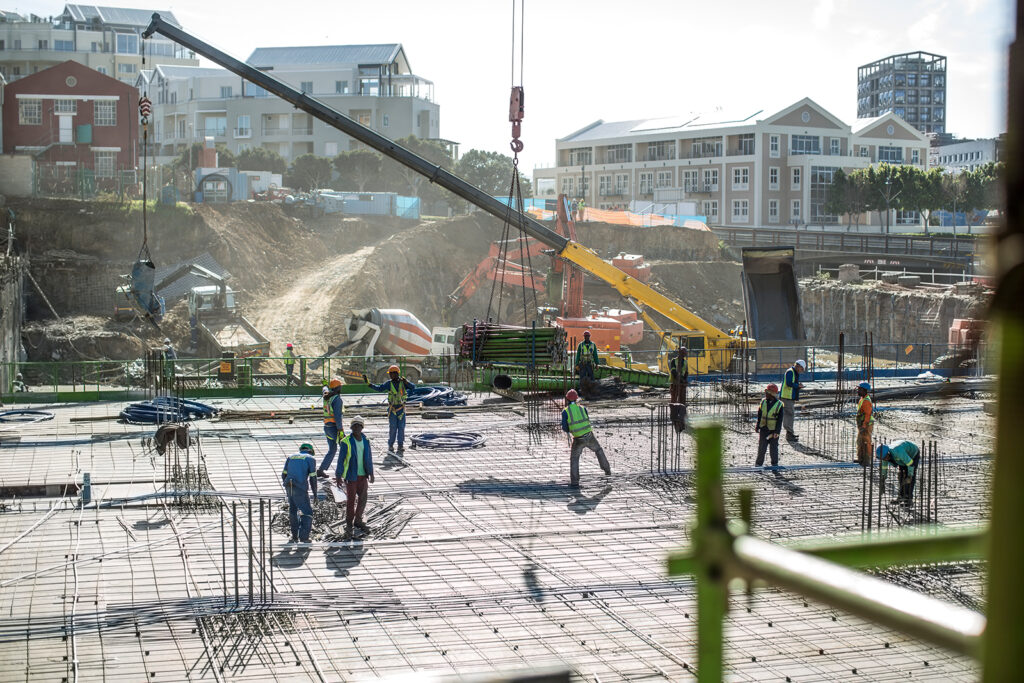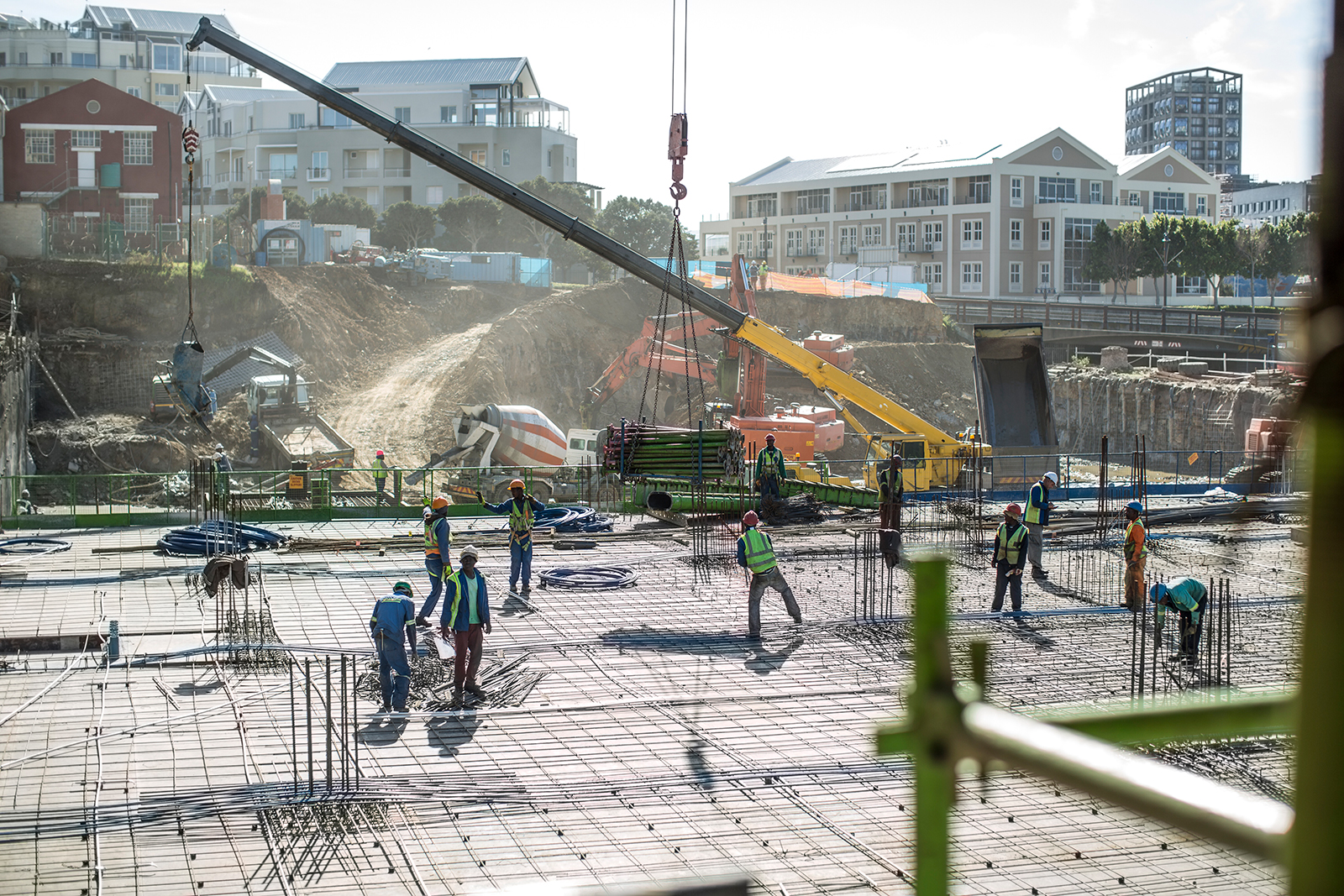What is Civil Construction?

Civil construction plays a fundamental role in shaping the built environment around us. This branch of civil engineering focuses on designing, developing, and maintaining essential infrastructure such as roads, railways, buildings, and more. The significance of civil construction cannot be overstated; it is the backbone of modern society, enabling efficient transportation, reliable utilities, and safe public spaces.
Understanding civil construction is crucial for businesses planning infrastructure projects. By gaining insights into this field, companies can make informed decisions that enhance project efficiency and cost-effectiveness. Knowledge in civil construction also helps businesses:
- Select the right contractors
- Ensure compliance with regulations
- Optimize resource management
In today’s fast-paced world, aligning your business goals with cutting-edge construction practices can yield significant benefits. By familiarizing yourself with different types of construction designs and their applications, such as those outlined in our guide on Warehouse Types: A Comprehensive Guide to Construction & Design, businesses can better plan for future projects.
Defining Civil Construction and Its Key Components
Civil construction, a branch of civil engineering, is dedicated to the design, development, and maintenance of both natural and built environments. This field plays a crucial role in creating essential infrastructure that supports our daily lives.
Core Elements of Civil Construction
Civil construction encompasses a broad range of projects, each with unique requirements and challenges. Some key components include:
1. Roads
Vital for transportation, roads can vary from small residential streets to expansive highways.
2. Railways
These include everything from light rail systems in urban areas to high-speed trains connecting major cities.
3. Buildings
Encompassing residential, commercial, and industrial structures.
4. Water Reservoirs
Crucial for water storage and management, these projects ensure a reliable water supply.
5. Subdivisions
Planned residential communities that require extensive infrastructure planning and development.
Diverse Range of Projects
The scope of civil construction goes beyond these core components. It includes:
Bridges: From small pedestrian bridges to large-scale roadway crossings, these structures are essential for connectivity.
Canals: Used for irrigation, transportation, and flood control.
Wastewater Treatment Plants: Critical for managing and treating sewage to protect public health and the environment.
Airports and Ports: Major transportation hubs that facilitate global travel and trade.
Dams: Used for power generation, water supply, and flood control.
Civil construction also encompasses specialized structures like retaining walls. For example, MBC Management specializes in Concrete Retaining Walls, which contribute to various projects by providing necessary support and stability.
Another area within civil construction is the development of subdivisions. These planned communities involve comprehensive infrastructure development, such as roads, utilities, and public spaces. One notable project is the Sealy ISD Elementary Parking Expansion, where MBC Management enhanced accessibility and convenience for the school community.
By understanding the broad scope of civil construction projects and their significance, businesses can better plan their infrastructure needs. This knowledge ensures alignment with best practices in design, development, and maintenance for successful project outcomes.
The Crucial Role of Civil Engineers in Ensuring Successful Project Delivery
Civil engineers play a crucial role in the success of any construction project. They are involved in every step, from designing to maintaining the structure. This comprehensive involvement ensures that projects not only meet but exceed safety and durability standards.
1. Expertise in Design and Planning
Civil engineers are responsible for creating detailed plans and blueprints for various structures, such as roads, bridges, and buildings. They:
Conduct feasibility studies and environmental impact assessments to ensure the project’s viability.
Consider factors like soil stability, traffic flow, and potential environmental impacts when planning.
2. Overseeing Construction Activities
During the construction phase, civil engineers:
Supervise all activities to ensure they meet the project specifications and regulatory requirements.
Coordinate with contractors and suppliers to stay on schedule and within budget.
3. Ensuring Safety and Durability
Civil engineers play a vital role in ensuring the safety and durability of structures:
They implement strict quality control measures to ensure materials and workmanship meet high standards.
This focus on quality reduces the risk of structural failures and extends the lifespan of the infrastructure.
4. Maintenance and Upgrades
Even after construction is complete, civil engineers continue to be involved in maintaining infrastructure:
Regular inspections and maintenance activities help identify potential issues early on.
This allows for timely upgrades and repairs, ensuring that bridges, roadways, etc., remain safe for public use.
Understanding the role of civil engineers helps businesses appreciate the importance of selecting experienced professionals for their projects. Their expertise ensures that every phase—from design to maintenance—is executed flawlessly, providing long-term benefits in terms of safety, durability, and cost-effectiveness.
For businesses planning to optimize their operations, commercial warehouse layout planning is another area where civil engineers can provide invaluable assistance. A well-designed warehouse layout can significantly improve efficiency and productivity by optimizing storage space, streamlining workflows, and enhancing overall logistics management.
Key Phases in Civil Construction Process
Civil construction projects involve several critical phases that ensure the successful completion of infrastructure developments. Each phase is meticulously planned and executed to ensure structural integrity, efficiency, and sustainability.
Site Preparation
Site preparation is the initial step in any civil construction project. This phase includes:
Clearing and Grubbing: Removing vegetation, rocks, and other obstructions from the site.
Grading and Leveling: Ensuring the ground is at the correct level for construction activities.
Utility Relocation: Moving existing utility lines to prevent interference with new structures.
Excavation
Excavation involves removing soil or rock to create a foundation for structures. This phase is crucial for projects like:
Earthwork Projects: Includes tasks such as digging trenches for pipelines or creating embankments for roadways.
Foundations: Preparing the ground for building foundations, ensuring stability and support.
Specialized Structures Construction
This phase focuses on constructing specific infrastructure elements like canals and wastewater treatment plants.
Canals
Building canals involves:
Designing Water Flow Paths: Ensuring efficient water movement and avoiding erosion.
Excavation and Lining: Digging the canal path and lining it with materials to prevent seepage.
Wastewater Treatment Plants
Constructing wastewater treatment plants includes:
Treatment Processes Design: Planning stages for treating wastewater effectively.
Facility Construction: Building tanks, holding ponds, and other necessary structures.
Each phase in civil construction requires meticulous planning, skilled labor, and adherence to safety standards. By understanding these key phases, businesses can better appreciate the complexities involved in delivering successful infrastructure projects.
Incorporating Technology for Enhanced Efficiency and Sustainability in Civil Construction
Innovative technologies are changing the way civil construction works, making it more efficient and sustainable. One such technology is Building Information Modeling (BIM). BIM allows us to create detailed 3D models that give us information about every part of a construction project. This technology helps us work together better, make smarter choices, and find problems before they become big issues.
Another important technology in the industry is Drone surveying. Drones can take high-quality pictures and videos of construction sites, giving us up-to-date information that is crucial for understanding the site and keeping an eye on things. Using drones not only makes inspections safer but also helps us finish projects faster.
Benefits of Using Technology in Civil Construction
Using advanced technologies like BIM and drones in civil construction has many advantages:
- Projects get done faster: By making things more organized, these technologies can help us finish projects more quickly.
- We use our resources better: Getting accurate information helps us use our materials and equipment in the best way possible.
- We stay safe: Technologies like drone surveying make inspections safer and improve overall site safety.
- It saves money: Finding problems early with BIM models can stop us from having to fix expensive mistakes later on.
For example, MBC Management has shown how well these technologies can work in real projects. Check out their past work to see how they used innovative tech solutions to get great results, including their partnership with T&S RV & Sport Store.
To learn more about modern road and highway construction methods that use the latest technologies, check out this article.
Using these new technologies not only helps us get more done but also fits in with the industry’s focus on being sustainable. As we move towards a future where smart infrastructure is the standard, using these tech solutions will be necessary for success in civil construction.
Ensuring Quality and Safety Compliance in Civil Construction Projects
Stringent quality control measures and effective safety protocols are fundamental in civil construction endeavors. These practices ensure the durability, safety, and compliance of structures with relevant regulations.
Importance of Quality Control
Quality control in civil construction involves systematic procedures to maintain standards throughout a project’s lifecycle. Key components include:
Material Testing: Ensuring all materials meet specified standards before use.
Inspection Procedures: Regular inspections at different stages to identify and rectify defects.
Documentation: Keeping detailed records of tests, inspections, and any corrective actions taken.
For example, when constructing a road or building, materials like concrete and steel undergo rigorous testing to meet strength specifications. This minimizes the risk of structural failures and ensures longevity.
Safety Measures
Safety in civil construction is non-negotiable. Effective safety protocols protect workers and the public from potential hazards. Critical safety measures encompass:
Personal Protective Equipment (PPE): Mandatory use of helmets, gloves, safety goggles, and other PPE.
Safety Training: Regular training sessions for workers on handling equipment and emergency procedures.
Site Security: Implementing barriers, warning signs, and restricted access zones to prevent accidents.
Projects like wastewater treatment plants often involve hazardous materials. Proper safety protocols ensure worker health and environmental protection.
Integrating Quality and Safety
The integration of quality control and safety measures creates a robust framework for project execution. For instance, in Montgomery County where we offer construction services that adhere to these principles:
Seamlessly incorporating these aspects into the project management approach enhances efficiency while minimizing risks.
Adherence to stringent quality control measures and effective safety protocols is pivotal in civil construction projects. It ensures not only compliance with industry standards but also fosters trust among stakeholders by delivering reliable and safe infrastructure.
By emphasizing these aspects, businesses can achieve successful project outcomes while safeguarding their workforce. Adopting best practices in quality control and safety remains crucial for any civil construction endeavor.
The Future of Civil Construction: Sustainable Practices, Smart Infrastructure, and Specialized Services
Civil construction is changing with a strong focus on sustainability and smart infrastructure. As environmental concerns become more urgent, the industry is adopting practices that:
- Minimize ecological impact
- Promote resource efficiency
Sustainability in Civil Construction
The focus on sustainability in civil construction is driving the integration of green building techniques and eco-friendly materials. These practices aim to:
Reduce the carbon footprint of construction projects
Enhance their environmental performance
Some examples include:
Green Building Techniques: Using design strategies like passive solar heating, natural ventilation, and energy-efficient lighting systems.
Eco-Friendly Materials: Incorporating materials such as recycled steel, bamboo, reclaimed wood, and low-VOC (Volatile Organic Compounds) paints.
These sustainable approaches not only help in reducing waste and conserving resources but also contribute to creating healthier living environments.
Smart Infrastructure
Smart infrastructure is a new way of building and managing civil structures. By using advanced technologies, smart infrastructure aims to:
Optimize resource utilization
Improve operational efficiency
Key technologies include:
Building Information Modeling (BIM): Enhances project planning and execution by providing detailed 3D models that integrate data from various sources.
Drone Surveying: Facilitates accurate site assessments and monitoring, reducing the need for manual inspections and accelerating project timelines.
The integration of smart infrastructure technologies ensures that civil construction projects are not only efficient but also resilient and adaptive to future demands.
Incorporating these innovative practices into civil construction projects can significantly enhance their sustainability and functionality. For businesses looking to stay ahead in the industry, understanding these trends is crucial.
However, it’s important to note that sustainable practices and smart infrastructure are not the only aspects shaping the future of civil construction. There are specialized services within the industry that deserve attention as well.
Specialized Services in Civil Construction
As the industry continues to evolve, specialized services are becoming increasingly important. Two such services include:
- Commercial Flooring: Commercial flooring plays a vital role in creating functional and aesthetically pleasing spaces. It offers a wide range of choices that perfectly balance aesthetics, durability, and value.
- Civil Engineering: Civil engineering is at the core of shaping our cities. With expertise in this field, construction services are driven by the principles of civil engineering.
These specialized services complement the overall sustainable and smart practices in civil construction, providing businesses with comprehensive solutions for their projects.
The movement towards sustainable practices, smart infrastructure, and specialized services marks a pivotal shift in civil construction, promising a future where efficiency, environmental responsibility, and tailored expertise go hand in hand.
Choosing the Right Civil Construction Partner for Your Business
Selecting a reputable and experienced civil construction firm is crucial for the success of any business project. The civil construction industry encompasses various specializations, each requiring specific expertise. When evaluating potential partners, consider their experience in relevant areas such as municipal engineering, structural engineering, and construction engineering.
Key Factors to Consider:
Specialization: Different projects demand different areas of specialization. For instance, municipal engineering focuses on public infrastructure like roads and sewage systems, while structural engineering deals with the design and integrity of buildings and other structures. A firm with a strong background in the particular type of project you are undertaking can offer valuable insights and solutions.
Reputation: Research the firm’s track record within the industry. Look for reviews, case studies, and testimonials from previous clients. A company with a solid reputation is likely to have a history of successful project delivery.
Experience: The number of years a firm has been in business can be an indicator of its reliability and expertise. Experienced firms are usually better equipped to handle unexpected challenges that may arise during a project.
Project Management Approach: Effective project management is vital for timely and cost-efficient completion. Inquire about the firm’s approach to managing projects, including their coordination with subcontractors, adherence to timelines, and resource management practices.
Relevant Services:
Understanding the range of services offered by civil construction firms can also guide your decision-making process:
Design-Build: This approach integrates both design and construction services, providing a streamlined process that can reduce costs and shorten project timelines.
Engineering Services: Comprehensive engineering services ensure that all technical aspects of a project are meticulously planned and executed.
Construction Management: Professional construction management services oversee every phase of a project from inception to completion, ensuring quality control and adherence to safety standards.
For businesses looking for top-tier civil construction partners, exploring available options like MBC Management’s Premier Civil and Structural Engineering Services can be beneficial. Their expertise spans from foundation work to comprehensive construction solutions, covering everything from municipal engineering to structural engineering.
Additionally, specialized services such as Form Place Finishes offered by MBC Management can significantly enhance both aesthetics and durability in concrete projects.
By considering these factors and exploring specialized services, businesses can make informed decisions when selecting a civil construction partner, thereby ensuring successful outcomes for their projects.
Key Considerations When Hiring a Civil Construction Company
Choosing the right civil construction company is crucial for any business looking to undertake infrastructure projects. Here are some important factors to consider:
1. Project Management Approach
A company’s project management approach directly affects the efficiency and success of a project. Look for firms that:
Use advanced project management tools such as Building Information Modeling (BIM) and integrated project delivery systems to streamline processes.
Embrace agile methodologies, which allow for flexibility and quick responses to unforeseen challenges.
Prioritize transparent communication through regular updates and open channels between all stakeholders.
2. Track Record and Experience
Assessing the past performance of a potential contractor can provide insights into their reliability and expertise. Important points to consider include:
Reviewing their portfolio to see if they have successfully completed projects similar in scope and complexity to yours.
Seeking feedback from previous clients through testimonials to gauge their work ethic, professionalism, and quality of results.
3. Specialization
Different civil construction projects require specific skill sets. Ensure the company you choose has experience in your particular area of need, whether it’s municipal engineering, structural engineering, or other specialized fields.
4. Compliance with Safety Standards
Safety is paramount in civil construction. The firm should strictly adhere to safety protocols, minimizing risks for both workers and the public.
5. Financial Stability
A financially stable contractor is less likely to face disruptions due to cash flow issues, ensuring your project stays on track.
By thoroughly evaluating potential contractors based on these criteria, businesses can significantly improve their chances of achieving successful project outcomes.
Trends to Watch Out for in the Civil Construction Industry
The civil construction industry is changing quickly, adopting new technologies and methods that improve project efficiency, sustainability, and overall quality. Here are some important trends shaping the future of civil construction:
1. Modular Construction Methods
Modular construction has become increasingly popular in recent years. This approach involves building components off-site in controlled environments and then assembling them on-site. Some of the benefits include:
Reduced Construction Time: Projects can be completed 30-50% faster than traditional methods.
Improved Quality Control: Factory settings enable strict quality checks.
Cost Savings: Streamlined processes lower labor and material costs.
2. Sustainable Building Practices
Environmental concerns are leading to the adoption of sustainable practices in the civil construction sector. Some examples include:
Green Building Materials: Use of recycled steel, bamboo, and other eco-friendly materials.
Energy-Efficient Designs: Incorporation of solar panels, energy-efficient HVAC systems, and smart lighting solutions.
Water Conservation: Implementation of rainwater harvesting systems and low-flow fixtures.
3. Technological Innovations
Technology is changing civil construction, making projects more efficient and accurate. Some key innovations include:
Building Information Modeling (BIM): Improves collaboration among stakeholders by providing a digital representation of physical spaces. It supports better planning, design, and maintenance.
Discover exciting career opportunities related to BIM implementation at MBC Management.
Drone Surveying: Drones provide aerial views of construction sites, facilitating detailed surveys and inspections without human risk. They also offer real-time data collection for better decision-making.
4. Advanced Concrete Placement Techniques
Concrete is still widely used in civil construction. Innovations in concrete placement techniques are improving durability and reducing environmental impact.
Learn about the latest advancements in commercial concrete placement with MBC Management’s services.
5. Smart Infrastructure
The integration of Internet of Things (IoT) technologies into infrastructure projects is creating “smart” buildings and transportation systems. Some features include:
Real-Time Monitoring: Sensors track structural health, environmental conditions, and energy usage.
Predictive Maintenance: Data analytics predict when maintenance is needed, reducing downtime.
Enhanced User Experience: Smart traffic lights, connected public transport systems, and intelligent parking solutions improve urban living.
These trends show how the civil construction industry is always changing as it deals with new challenges and opportunities. Businesses need to stay updated on these developments to make the most of them.
Conclusion
Understanding the intricacies of civil construction empowers businesses to achieve successful project outcomes. Partnering with experienced firms ensures that each phase of construction is handled with precision and expertise, leading to durable and efficient infrastructure.
Civil construction plays a pivotal role in driving infrastructure growth, encompassing a wide range of projects such as roads, bridges, water reservoirs, and more. Recognizing its significance can lead to better planning and execution of projects in the civil construction industry.
For businesses looking to delve deeper into specific areas like Bridge Design, which is both an art and science in structural engineering creating functional and iconic connections, or specialized projects like the Pressure Cannon Test Pit, it is crucial to collaborate with firms that have a proven track record in these domains.
By leveraging the knowledge and expertise available within the civil construction sector, businesses can contribute to sustainable and smart infrastructure development, ultimately benefiting communities and economies alike.




